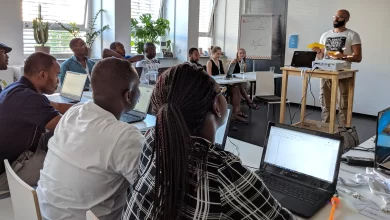Richard Baldwin & Nicolas Goldstein for a cross Interview

We are so happy to receive today Richard Baldwin and Nicolas Goldstein for a cross Interview : Richard Baldwin is a prominent figure in the realm of economics, particularly known for his insightful contributions to the understanding of globalization and its impact on various aspects of the economy. As a professor of Economics at IMD, Baldwin brings a wealth of knowledge and experience to the table.
Nicolas Goldstein is a dynamic entrepreneur and a driving force behind the innovative talent platform, Talenteum. As the co-founder of Talenteum, he brings a wealth of experience and a visionary approach to the intersection of technology and Global talent acquisition. Mainly in Africa with the 1st Social Bridging Platform connecting Talents from Africa with International Employers.
NG : I read a lot about you and your studies and I would like to have your point of view about telemigration. You said recently that Telemigration is simply working from home when home is abraod. Could you explain this ?
RB : In contemplating the future of work, telemigration, or working from home when home is abroad, is poised to be a significant factor in the years to come. This concept, as I’ve mentioned before, essentially involves individuals working remotely for companies in foreign countries. The dynamics of the global workforce have shifted, and telemigration is a manifestation of this transformation.
NG : A large share of service firms in Europe and America have learned to work with remote teams are they ready to work with foreigners remotely. What jobs is the most teleworkable ?
RB : The pandemic has accelerated the adoption of remote work, and many service firms in Europe and America have become adept at working with remote teams. However, the readiness to work with foreigners remotely is a nuanced challenge.
While the technical aspects of remote collaboration have been streamlined, cultural, legal, and managerial considerations still need attention.
Certain jobs are more amenable to telework than others.
Knowledge work, such as programming, design, analysis, and even some aspects of marketing, can often be accomplished effectively in a remote setting.
On the other hand, roles that require physical presence, hands-on activities, or a high degree of coordination may find telework more challenging.
RB : Nicolas Let’s talk about your platform you build with your partner John Benatouil , could you pitch it to us ?
Sure, with pleasure Richard !
Talenteum.com stands at the forefront of revolutionizing traditional hiring practices
By introducing a dynamic and efficient model. For businesses seeking skilled professionals outside their borders and individuals seeking global remote opportunities.
We are starting with Africa to build a global Talent pool.
We offer access to a diverse and extensive global talent pool. It goes beyond local limitations, allowing businesses to tap into a wealth of skills and expertise from around the world.
Talenteum.com is committed to fostering digital inclusion. It provides a space where individuals from various backgrounds, regardless of their geographical location, can showcase their skills and connect with opportunities that align with their expertise.
RB : Thank you Nicolas for this Pitch
NG : Richard, What is the barrier you see for Southern countries like Colombia or Kenya for example for remote work ?
RB : Southern countries, like Colombia or Kenya, face both opportunities and challenges in the realm of remote work. On the positive side, they can tap into a global job market without the constraints of geographical proximity. However, challenges include the need for robust digital infrastructure. Ensuring a skilled workforce, and navigating potential cultural differences that can impact remote collaboration.
NG : What about Regulatory barriers ?
RB : Regulatory barriers pose a significant challenge to the widespread adoption of telemigration. Legal frameworks often lag behind technological advancements. Countries may need to adapt their regulations to accommodate remote work across borders. Harmonizing international legal standards for remote work could be a key step in overcoming this obstacle.
NG : Where do the teleworkers come from mainly ?
RB : Telemigrants predominantly come from countries with established digital infrastructure and a high level of digital literacy. However, efforts to bridge the digital divide and enhance digital skills in emerging economies can broaden the pool of potential telemigrants. The growth market for telemigration is expansive. As companies become more comfortable with remote work. Overcome initial challenges, they are likely to tap into global talent pools. IT, software development, digital marketing, and creative services are poised for significant telemigration growth.
In conclusion, the future of work is undeniably intertwined with the concept of telemigration. As companies increasingly recognize the possibilities offered by remote collaboration across borders, we can anticipate a more inclusive and globally connected workforce.
However, addressing the challenges, from regulatory frameworks to cultural nuances, will be crucial in realizing the full potential of telemigration.




